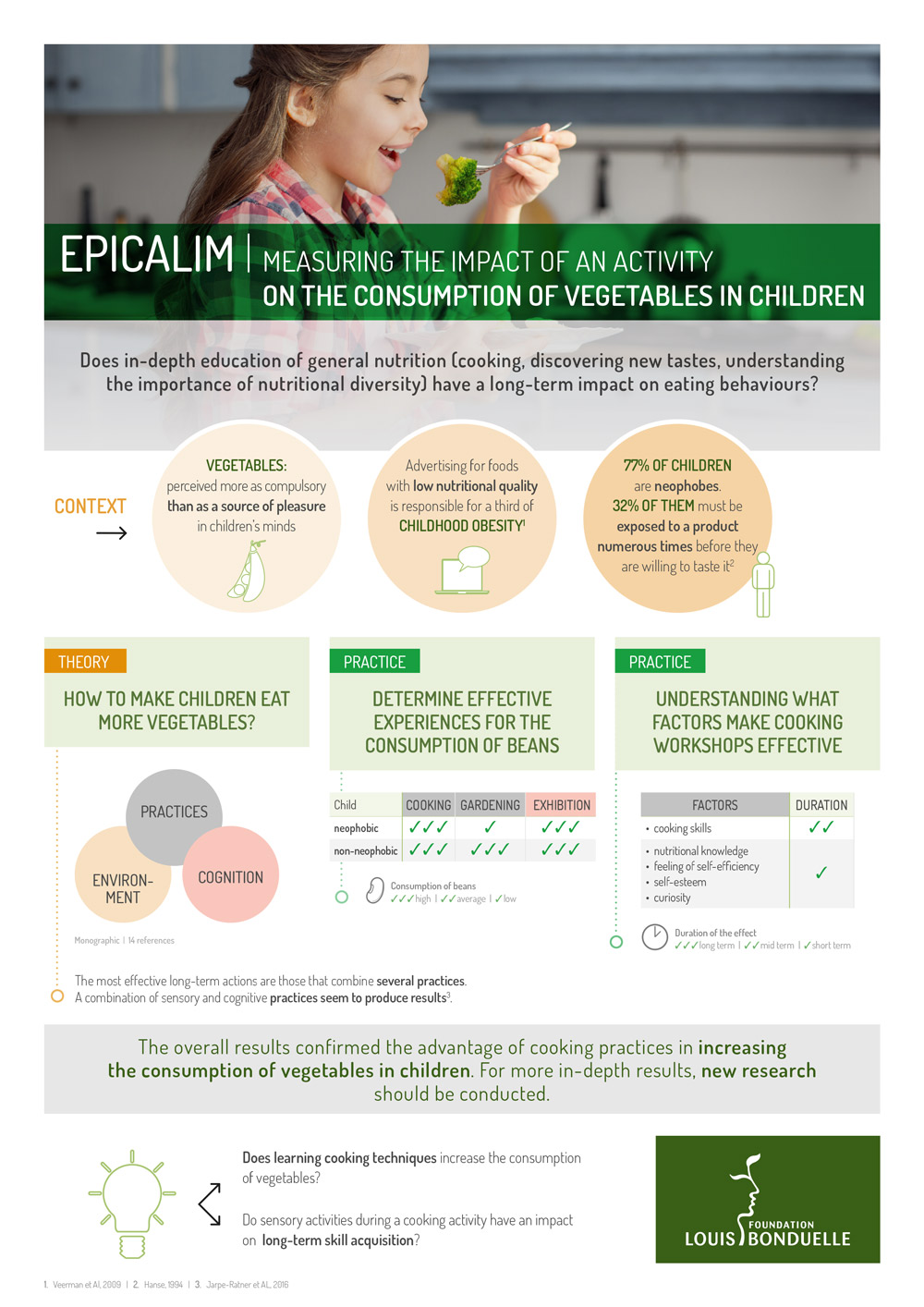Fun is the key in getting children to like vegetables
Alongside its support for research through the Louis Bonduelle Research Award and its corporate patronage, the Louis Bonduelle Foundation also carries out its own scientific research, working with academic partners. This work focuses primarily on children’s consumption of vegetables and other plant-based foods, and aims in particular to measure the effectiveness of actions in the field, and to understand the drivers of vegetable consumption. Over the past five years, one project has drawn the attention of our scientific experts: the EPICALIM project.
It is quite clear that, if we are to diversify our diets, the key to ensuring the presence of vegetables is to make them as familiar as possible, and as soon as possible. This is why educationalists are looking to increase children’s contact with vegetables in whichever way – as long as it is enjoyable, whether through cookery workshops, vegetable gardens, exhibitions, board games, story book heroes or figurines. The aim of the EPICALIM project was therefore to those fun activities with the greatest impact on children’s behaviour.
Research carried out over two years
The EPICALIM project is part of an important review of scientific literature. Analysis of 17 scientific experiments has shown that actions that combine several practices (e.g.: culinary activities and nutritional education) lead to a significant increase in children’s consumption of vegetables.
Building on these observations, the Louis Bonduelle Foundation has launched two joint scientific partnerships to further investigate these findings.
- The first was carried out with Epicurium (a discovery centre all about fruit and vegetables, in the Vaucluse Department of France), which first developed an educational exhibition on legumes. Subsequently, the partnership continued with the EPICALIM project, based on two studies and different educational workshops.
- The second was conducted with the Institut de Tourisme et d’Hôtellerie du Québec, with a particular focus on how children behaved in the kitchen.
Combining fun activities and cooking vegetables: a winning formula!
The main results of this in-depth research, broadly summarised in the infographic below, reveal that:
- Actions combining different approaches (culinary activities and nutritional education) lead to a significant increase in children’s vegetable consumption.
- A practical workshop (gardening or cooking) can lead to a significant increase in the consumption of legumes, a food type often shunned by children.
- The impact of a cookery workshop varies according to the child’s degree of neophobia.
- A cooking workshop has a greater impact on the consumption of legumes by neophobic children than a gardening workshop.
- Hands-on workshops lead to an increase in the consumption of several types of new plant-based foods.
- Cooking activities help children to develop new skills, such as self-efficacy, self-confidence and curiosity.
- A cooking workshop has a significantly greater impact on vegetable consumption than an exhibition (highlighting messages about nutrition and origin, for example), which does not increase familiarisation.
- Playing a Memory-type game with vegetables tends to increase vegetable consumption, but only when the foods are familiar.
Choosing fun activities according to children’s characters
What recommendations can be drawn from the Foundation’s two years of research? The first obvious recommendation with regards to neophobia is to familiarise children with as many different vegetables as possible from the youngest age. In other words, to maximise the child’s exposure to vegetables. This means:
- taking the time to explain what vegetables are,
- leading by example,
- starting with a variety of vegetables as soon as solid foods are introduced,
- including vegetables in all their forms in as many preparations as possible,
- shopping or harvesting together,
- starting meals with a vegetable to create a habit from the youngest age.
However, one type of activity – the cooking workshop – seems to work best on all children, regardless of their character. Gardening, however, depends on the child’s temperament. If your child is neophobic, introducing a new vegetable in a garden may actually inhibit consumption. If on the other hand, if your child is not neophobic, letting them become familiar with and harvest the vegetable themselves will encourage consumption!



 Vegetable garden: growing lamb's lettuce
Vegetable garden: growing lamb's lettuce 









